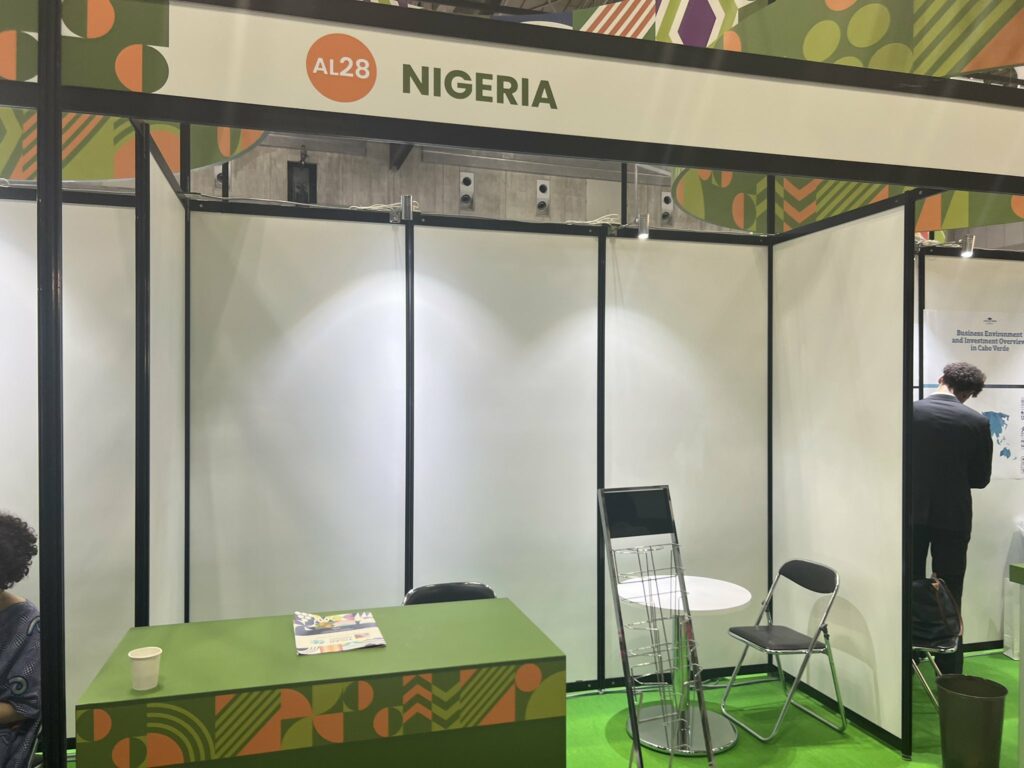Africa
The Empty Booth and the Burden of Hercules -By Ozuomba Egwuonwu
Whether Hercules himself could succeed in such a land remains uncertain. But what is clear is this: unless Nigeria learns to gather in sincerity within its own booth, it will remain what the world saw at TICAD 9—a hollow shell, echoing with not just absence, but debilitating hauntings of what should have been.

At TICAD 9, Nigeria’s empty booth is not just a vacant space representing a logistical failure or poor coordination—it was a metaphoric reflection of the Nigerian state itself. A vast land with promise, yet a hollowed center where sincerity of purpose should have been. A nation with space enough to gather, but where few gather sincerely; where those most endowed with youth, talent, and vigor are restless to escape rather than remain.
The booth becomes a parable. For a nation that should brim with investors, thinkers, innovators, and patriots, but instead stands deserted, its chairs empty, its tables unattended, its air stale.
Vacant not because there are no Nigerians to fill them, but because the Nigerian soul has grown weary of its own space. The gifted young, who should be merchants of hope, cannot wait to depart. The booth, like the homeland, is abandoned not because it lacks promise but because it is emptied of faith and hope. And so the empty booth is not simply at TICAD, it is in every government office where duty is absent, in every rural farm abandoned by security, in every factory where machines lie rusted, and in every dream deferred by ethnic suspicion and political betrayal.
To imagine Peter Obi confronting this void is to imagine Hercules at the gates of Augean filth, faced with rot so ancient that it reeks of inevitability. The booth, like the country, is not just to be filled with bodies (who have forgotten the art of gathering, who for decades, has rehearsed disunity, ethnic suspicion, religious fracture, and the quiet treason of mediocrity enthroned by design), but with sincerity. Yet sincerity has become the scarcest currency in Nigerian politics.
Obi’s Herculean task, then, is not simply to fill a booth. It is to restore faith in gathering itself, to persuade Nigerians that their collective destiny is worth a seat at the table. To do this, he must sweep the Augean stables not once but continually, against the tide of entrenched interests, ethnic fissures and generational insincerity. To gather Nigerians under one tent of sincerity will demand more than charisma, it will demand exorcism.
Even if Obi, by sheer force of personality and moral capital, wins the buy-in of weary citizens, the harder task remains: persuading foreigners that the Nigerian booth is worth entering at all.
Tinubu’s government claims to have attracted $238 million. But closer inspection reveals that this, like much of the regime’s record, is yet another illusion-another loan disguised as investment, propaganda recycled as progress. For a man who openly boasted that he “bought” the presidency, there is no obligation to truth, only the need to sustain the mirage long enough to outlast accountability. Nigeria’s rulers, time after time, have turned governance into a bazaar of deceit, selling to the people not goods, but shadows.
Foreigners pass by the Nigerian stall not because they cannot see it, but because they no longer expect it to be alive. They have been invited before, only to discover that the promise of partnership was a mirage of figures announced with fanfare and forgotten in practice.
Suppose, however, that Obi succeeds where they have failed, that he wrests the demons of insecurity, erects the long-broken pillars of infrastructure, and restores the rule of law. Even then, his triumph would be precarious, for history tells us that Nigeria mutilates its own victories. Ethnic and religious bigotry are embedded like thorns in its political flesh-(Ports strangled so that only Lagos breathes; Railways stretched toward Niger Republic while home networks rot; Gigantic projects and expenses like Ajaokuta Steel or INEC- monuments to myopic self sabotage and arrested development) all amidst the bureaucratic poison of “federal character,” a policy that too often enshrines incompetence and mediocrity in the place of merit. These are not accidents of governance but deliberate architectures of imbalance—built to keep Nigeria’s booth permanently hollow.
And beyond structural sabotage lies the contagion of corruption. Even if Obi clears the booth, opens the gates, and beckons the world in, who will steward the tables? For the average Nigerian politician and public officer is not just corrupt in deed but in imagination. They do not see the booth as a gathering place for collective destiny, but as a personal stall in a market of plunder. Here lies the final Herculean labor: how to cleanse not merely institutions but the very souls of those who have been trained, generation after generation, to steal and sabotage.
Thus, the Nigerian booth at TICAD 9 was more than empty—it was haunted. Haunted by the ghosts of promises broken and futures aborted. Haunted by the exodus of its children and the silence of those who remain. Haunted by the knowledge that one man, no matter how resolute, cannot alone summon sincerity where none exists.
Obi’s Herculean task, then, is not simply to fill a booth. It is to restore faith in gathering itself, to persuade Nigerians that their collective destiny is worth a seat at the table, and to convince a skeptical world that this haunted booth can once again host possibilities.
Whether Hercules himself could succeed in such a land remains uncertain. But what is clear is this: unless Nigeria learns to gather in sincerity within its own booth, it will remain what the world saw at TICAD 9—a hollow shell, echoing with not just absence, but debilitating hauntings of what should have been.

























